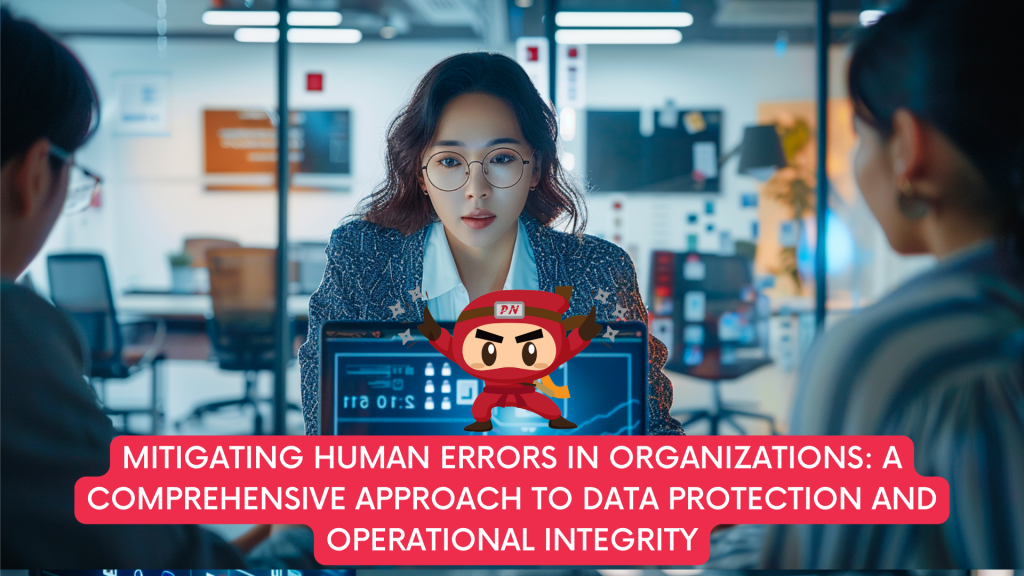
Where organizations rely heavily on technology to streamline operations and manage vast amounts of data, the risk of human errors looms large. These errors, whether in data handling or coding, can have significant financial implications and threaten the reputation and trust of the organization. Therefore, it’s imperative for businesses to establish robust policies and procedures aimed at mitigating these risks and ensuring compliance with data protection regulations.
Organizations often grapple with the repercussions of human errors, which can prove to be financially burdensome. Whether it’s an accidental disclosure of sensitive information, a misconfigured database, or a simple typographical error in code, the consequences can be far-reaching. Apart from potential legal fines and penalties for non-compliance with data protection laws, there’s also the risk of reputational damage and loss of customer trust.
Moreover, in industries where the slightest mistake can lead to catastrophic outcomes, such as healthcare or finance, the importance of error prevention becomes even more critical. A single coding error in a medical device software or a financial algorithm can lead to life-threatening situations or massive financial losses. Therefore, organizations must prioritize the implementation of measures to minimize the likelihood of human errors in all aspects of their operations.
One of the key areas where human errors can have severe consequences is in handling personal data. With the increasing prevalence of data breaches and cyber threats, organizations must take proactive steps to protect the privacy and security of sensitive information. This starts with establishing robust policies and procedures for data handling, storage, and transmission.
By implementing strict access controls, encryption protocols, and regular security audits, organizations can reduce the risk of data breaches caused by human error. Additionally, providing comprehensive training and awareness programs for employees can help instill a culture of data security within the organization. Employees should be educated on the importance of data protection, the potential consequences of mishandling data, and best practices for safeguarding sensitive information.
Furthermore, organizations should appoint dedicated data protection officers or teams responsible for overseeing compliance with data protection regulations and ensuring adherence to internal policies. These individuals can serve as the first line of defense against human errors by implementing proactive measures and conducting regular assessments to identify and address potential vulnerabilities.
In addition to data handling, coding errors pose a significant risk to operational integrity and organizational interests. Whether it’s developing software applications, building websites, or managing IT infrastructure, coding errors can lead to system failures, downtime, and loss of revenue. Therefore, it’s essential for organizations to implement policies and practices aimed at preventing coding errors and maintaining the reliability and efficiency of their digital systems.
One approach to preventing coding errors is through rigorous testing and quality assurance processes. By conducting thorough code reviews, unit testing, and integration testing, organizations can identify and rectify errors before they impact the production environment. Automated testing tools and continuous integration pipelines can also help streamline the testing process and ensure the consistency and reliability of code changes.
Moreover, promoting a culture of collaboration and knowledge sharing among developers can help mitigate the risk of coding errors. By encouraging peer reviews, pair programming, and code refactoring sessions, organizations can leverage the collective expertise of their teams to identify and address potential issues early in the development lifecycle.
In conclusion, mitigating human errors in organizations requires a comprehensive approach that addresses both data protection and operational integrity. By establishing robust policies and procedures for data handling and coding practices, organizations can minimize the risk of costly mistakes and ensure compliance with regulatory standards.
Through proactive measures such as employee training, security audits, and rigorous testing, organizations can create a culture of accountability and excellence that prioritizes the protection of sensitive information and the reliability of digital systems. By investing in error prevention strategies, organizations can safeguard their reputation, maintain customer trust, and ultimately, achieve long-term success in today’s competitive business landscape.
Your appointed DPO can work with you on your PDPA compliance, ensuring that there will be policies in place to make sure that the handling of personal data is PDPA compliant.
A Data Protection Officer (DPO) oversees data protection responsibilities and ensures that organisations comply with the Personal Data Protection Act (PDPA). Furthermore, every Organisation’s DPO should be able to curb any instances of PDPA noncompliance as it is the officer responsible for maintaining the positive posture of an organisation’s cybersecurity.
DPOs complement organisations’ efforts to ensure that the organisation’s methods of collecting personal data comply with the PDPA. It also ensures that policies are set in place to make sure that there will be no instances of data breaches in the future.
Don’t wait any longer to ensure your organisation is PDPA compliant. Take our free 3-minute PDPA Compliance Self-audit checklist now, the same “secret weapon” used by our clients to keep them on track. Upon completion, we will send you the results so you can take the necessary action to protect your customers’ data. Complete the free assessment checklist today and take the first step towards protecting your customers’ personal data.
Role of Enhanced Access Controls in Safeguarding Personal Data in Telecommunications that every Organisation in…
Effective Incident Response Procedures in Strengthening Data Security that every Organisation in Singapore should know…
Crucial Role of Regular Vulnerability Scanning that every Organisation in Singapore should know. Strengthening Your…
Enhancing Data Security with Multi-Factor Authentication that every Organisation in Singapore should know. Enhancing Data…
Strong Password Policy as a first line of defense against data breaches for Organisations in…
Importance of Efficient Access Controls that every Organisation in Singapore should take note of. Enhancing…
This website uses cookies.